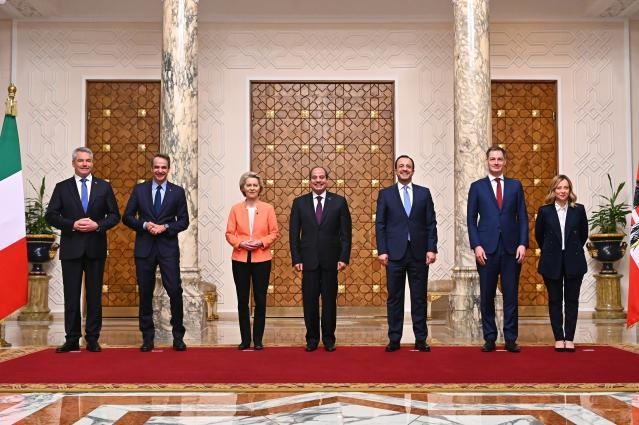The EU’s strategic partnerships with third countries are supposed to include human rights clauses that condition the financial assistance to them on the respect of democratic and human rights but often these concerns are downgraded because the main aims of the agreements are economic cooperation or migrant management.
At for example the EU-Central Asia Summit in Samarkand last Friday the focus was on economic cooperation with five central Asian countries - all of them described as ‘non-free’ with low scores on political rights. In their joint press release leaders expressed perfunctorily their commitment to the promotion and protection of the rule of law, human rights and fundamental freedoms.
Another example was the announcement last week that the European Parliament had approved the European Commission’s proposals for financial assistance to Egypt and Jordan.
In a statement, the EU delegation to Egypt said that the macro-financial assistance (MFA) to Jordan, €500 million in loans, was conditioned on that Jordan respects effective democratic mechanisms – including a multi-party parliamentary system – and the rule of law, and guarantees for respect of human rights. Nothing was said about the conditions for the €4 billion loan to Egypt.
The proposal follows the visit in Cairo in March 2024 when an EU delegation led by Commission President von der Leyen met Egypt’s President Abdel Fattah El-Sisi to sign a Joint Declaration for a Strategic and Comprehensive Partnership. The new partnership is supported by a financial and investment package of €7.4 billion for the coming four years (2024 – 2027).
Compared to the deal with Tunisia in 2023, this deal was even more controversial due to the authoritarian regime of President El-Sisi, who took power in coup in 2013 after a violent suppression of protestors. In the case of Tunisia, the European Ombudsman wrote after an inquiry that Commission had not been transparent about the human rights information it relied on before signing the agreement.
Asked if there are any conditions linked to the financial assistance to Egypt, the Commission replied on Friday that the disbursements would be conditional on the following three sets of requirements:
The implementation of economic policy conditions to be agreed in a Memorandum of Understanding (MoU); an on-track disbursing IMF programme being in place; and the pre-condition that Egypt needs to make concrete and credible steps towards respecting effective democratic mechanisms – including a multi-party parliamentary system – and the rule of law and guaranteeing respect for human rights.
For Jordan, the third condition needs to be in place from the very start (ex-ante), while for Egypt, corresponding progress in the form of concrete and credible steps is required ahead of each disbursement.
According to the Commission, the same set of requirements was already in place for the €1bn MFA for Egypt implemented in 2024, with the disbursement preceded by a positive assessment of all three elements. It did not specify what steps have been taken by Egypt towards a multi-party parliamentary system, respecting the rule of law and guaranteeing respect for human rights.
The MFA to Egypt was approved by an overwhelming majority in the European Parliament - 452 votes in favour, 182 against and 40 abstention – but there were also critical voices that claimed that the Commission had removed conditionality connected to progress on democracy, human rights and the rule of law in the rollout of MFA for Egypt.
Spanish MEP Vicent Marzà Ibàñez (Greens/EFA), shadow rapporteur on the file in the parliament’s committee on International Trade (INTA) commented:
“The Commission cannot throw democracy and human rights to the wind. Handing tax payers’ money to a military regime without any regard for the rule of law undermines the EU’s standing in the world, is tantamount to endorsing autocracy and will fall short of improving Egyptian people's economic situation.”
M. Apelblat
The Brussels Times

